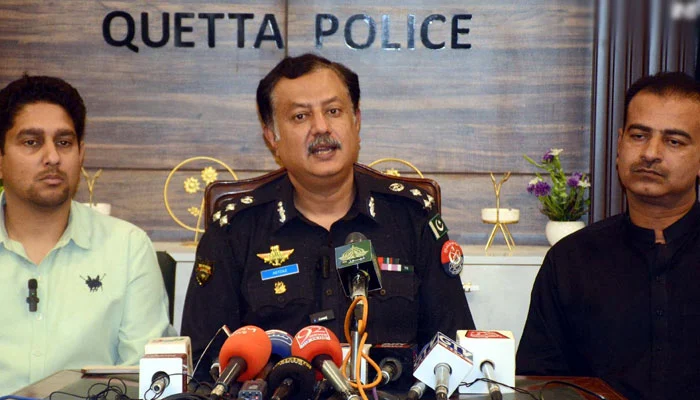The Balochistan government and police have defended their response to the recent Balochistan protests, asserting that public safety remains a top priority. Officials stated that discussions with the Balochistan National Party (BNP) are ongoing to address concerns.
During a press conference at the CCPO office, government spokesperson Shahid Rind and DIG Quetta Aitzaz Goraya highlighted the need to balance the right to protest with maintaining law and order. Rind explained that the unrest began on March 11, following an attack on the Jafar Express, which triggered a 24-hour clearance operation. The next day, the Baloch Yakjehti Committee (BYC) attempted to exhume bodies after burial, sparking demonstrations that blocked Sariab Road for over 12 hours. He stressed that while protests are a constitutional right, their timing and location must be approved by district authorities—something the BYC has consistently refused.
DIG Goraya provided details of events after the train attack. On March 14, five bodies were brought to Civil Hospital. When Prime Minister Shehbaz Sharif visited Quetta on March 19, BYC members arrived at the hospital to claim the bodies but were asked to provide legal heirs. Goraya questioned how members of the banned Balochistan Liberation Army (BLA) could have legitimate claimants. He accused protesters of attempting to seize the bodies forcefully, causing damage to hospital property.
The Balochistan protests escalated, leading to severe destruction. Goraya stated that demonstrators caused extensive damage, including destroying 36 CCTV cameras, 18 utility poles, and the main gate of Balochistan University. Protesters also set fire to a post office and attempted to loot a bank. In response, police used tear gas. During the chaos, BYC members placed three bodies on Sariab Road and accused police of killing them. Goraya dismissed the claim, questioning how random bystanders could have been shot if the police had opened fire.
Families of the deceased reportedly sought the bodies of their loved ones but were allegedly pressured by the BYC to continue protesting. Some families claimed that demonstrators even surrounded their homes, forcing them to stay involved.
Authorities arrested 61 individuals under the Maintenance of Public Order (MPO) Act. Of them, 13 were placed under judicial remand, while 35 minors were released after their parents provided assurances. Goraya pointed out that previous BYC demonstrations led to the burning of 13 police vehicles and injuries to officers.
On the political front, Rind confirmed that the BNP’s long march from Wadh to Quetta was restricted due to security threats. The party was invited to an in-camera session to discuss the region’s law and order situation. Additionally, he explained that internet services were suspended due to security concerns, and authorities are actively investigating the Mastung attack, which could have had serious consequences.
Regarding the potential ban on the BYC, Rind said he was unaware of any such decision but emphasized that legal recourse remains available. He assured that while the government remains open to dialogue, it will not tolerate destruction in the name of Balochistan protests.


